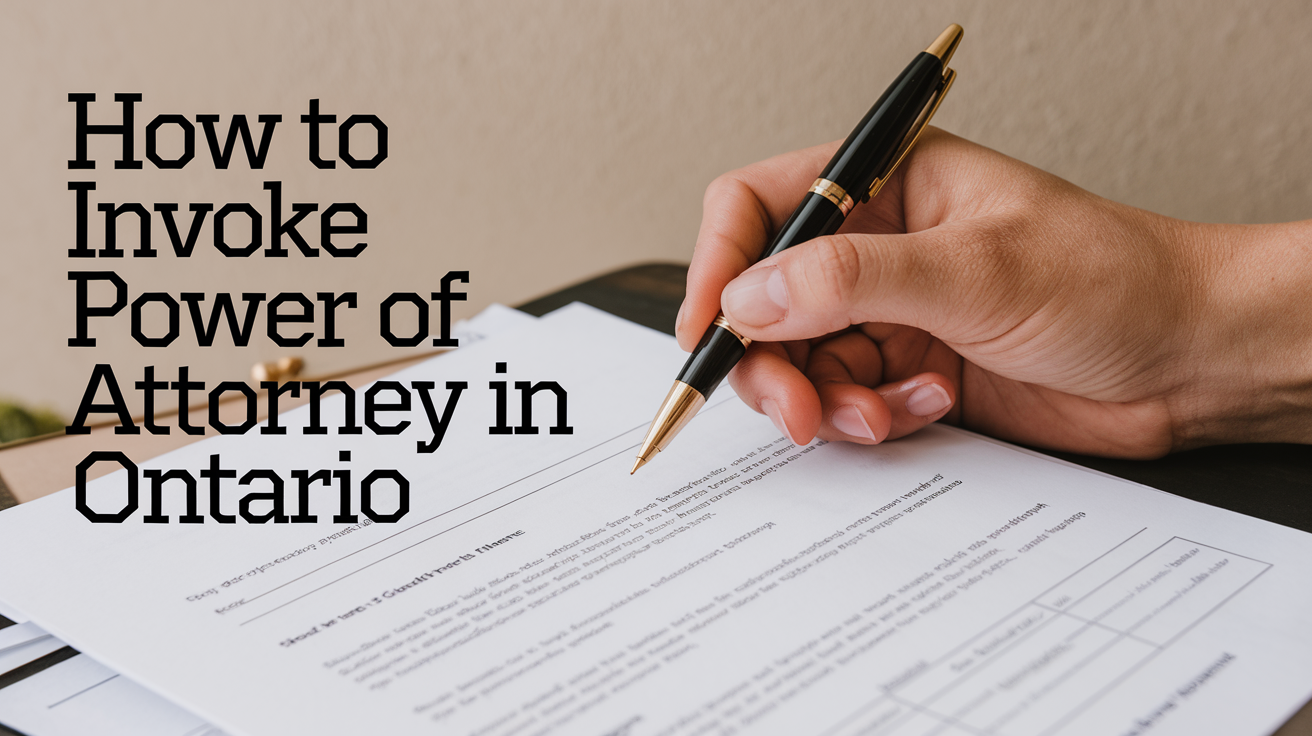
- Tajinder Kaur Sivia
- 15-Oct-2024
People’s future planning is not only related to finance or retirement but also includes much more. It also involves procuring for situations when a person is in a situation to make decisions on his/her on health, property, and finances. The one that seems to be the most common legal instrument in this province of Ontario is the Power of Attorney (POA).
What Is a Power of Attorney?
A Power of Attorney is a legal document in which another person, referred to as an Attorney, has the authority to make decisions for you where you cannot. In Ontario there are Powers of Attorney for personal care and property; however, the attorney does not have to be a lawyer. This particular attorney can represent you in case of sickness, disability of the mind or any situation that would hinder independent decision-making.
Situations which may arise out of accidents or due to sickness or through old age one may not be in a position to make proper decisions for himself. If you lack a properly executed POA, your friends and family can encounter numerous legal problems or even substantial time constraints when it comes to managing your financial affairs or property or making decisions about your healthcare.
Also Read: - What is a common-law spouse entitled to in ontario
Types of Power of Attorney in Ontorio
Ontario recognizes two main types of POA: Power of Attorney for Personal Care and Power of Attorney for Property.
- Power of Attorney for Personal Care
This type of POA permits an individual to make decisions concerning your health treatment, shelter, meals, and all your daily needs. Your attorney can make important medical decisions on your behalf such as accepting or rejecting treatment.
Key Responsibilities:
- Managing healthcare decisions (e.g., surgery, treatment plans)
- Overseeing daily personal care (e.g., meals, clothing)
- Making decisions about long-term care or housing
- Following any advanced directives you’ve provided (e.g., end-of-life wishes)
You can choose your attorney for personal care to be a person of close confidence, like a spouse, relative, or friend. This person should know you well in terms of your values and wishes.
- Power of Attorney for Property
This type of POA grants authority over financial and property-related decisions. It allows your attorney to manage your assets, pay your bills, sell property, and oversee your investments.
Key Responsibilities:- Managing finances (e.g., paying bills, filing taxes)
- Selling or maintaining property
- Collecting debts on your behalf
- Managing business or investment portfolios
A Continuing Power of Attorney for Property remains valid even if you become mentally incapable. It’s crucial to specify in your POA document when and under what circumstances your attorney can begin acting on your behalf. Without clear instructions, the attorney may be able to make decisions immediately.
Also Read: - Agreement of Purchase and Sale Ontario
How to Invoke Power of Attorney in Ontario
Once a Power of Attorney document is established, there may come a time when it needs to be invoked. Here are the steps to follow:
- Determine Mental Capacity
The POA becomes active when the individual (grantor) is deemed mentally incapable of making decisions. Mental incapacity could result from a sudden medical event, such as a stroke or injury, or gradual decline due to conditions like dementia. Mental incapacity is determined by a medical professional, who must declare that the person is no longer able to understand information or appreciate the consequences of decisions.
- Review the POA Document
The POA document should clearly outline when and how the power is to be invoked. For example, some POA documents specify that the attorney can only start acting on the grantor’s behalf after they’ve been deemed mentally incapable, while others may grant immediate authority. It's important to review these terms to understand when the power can be legally used.
- Notify Relevant Parties
Once the attorney is authorized to act, notify relevant parties, including:
- Financial institutions where the grantor holds accounts
- Healthcare providers involved in the grantor’s care
- Service providers such as insurance companies or property managers
Present a copy of the POA document to these parties to confirm the attorney’s authority.
- Take Action as the Attorney
After invoking the Power of Attorney, the attorney can begin making decisions in accordance with the grantor’s wishes and best interests. Financial matters may include paying bills or selling property. For personal care, this might involve decisions about healthcare or living arrangements.
It is important to note that the attorney is legally required to act in good faith and in the best interest of the grantor.
Legal Requirements for a Power of Attorney in Ontario
To ensure your Power of Attorney is legally binding in Ontario, the document must meet specific requirements:
- The document submitted must be on paper, as no electronic copy is permitted.
- He or she must be capable of making the decisions because of his or her mental state and must be over the age of 18 years for property decisions and 16 years for personal decisions.
- The grantor is required to sign the document with at least two other individuals acting as witnesses; the POA cannot be a witness. They also have to sign the document as witnesses of its freedom from forgery.
- The signatures must be authentic with the use of ink, and signatures made electronically or on a computer are not acceptable.
Who Can Witness a Power of Attorney Document?
Witnesses cannot be:
- The individual who shall be appointed as the attorney
- The attorney’s spouse or the attorney’s partner
- The grantee’s spouse, partner, or child
- Anyone under 18 years of age
When You Don't Have a Power of Attorney
Not having a Power of Attorney in place can result in significant complications for both you and your loved ones. Here’s what might happen:
- Personal Care Decisions Without a POA:If you are unable to make choices and have not appointed a POA for healthcare, your family can make some choices but cannot do all of them. The order of decision-making often entails the preference of a spouse, children, parents and siblings in that order. When a person does not have a POA, this process proves challenging and may take time before crucial health care decisions are made.
- Property Decisions Without a POA:If you don’t have a POA for property, your family won’t have the automatic right to manage your finances. They would need to apply to the courts for a legal guardianship to gain control over your financial affairs, which can be time-consuming and costly.
Do You Need a Lawyer to Create a Power of Attorney?
While you can create a POA document on your own using a free kit, it’s often advisable to work with a lawyer. A lawyer ensures that your document is comprehensive and legally binding, especially if your financial or personal circumstances are complex. Situations where legal advice is particularly important include:
- Owning property or assets in another province or country
- Running a business
- Having complicated family relationships
Conclusion
Invoking Power of Attorney in Ontario is a process that can significantly reduce stress and uncertainty for both you and your loved ones during difficult times. By setting up a Power of Attorney for personal care and property, you ensure that your wishes are respected and that trusted individuals can act on your behalf when necessary. Whether you create your POA document or seek legal advice, having one in place is essential to future planning.


